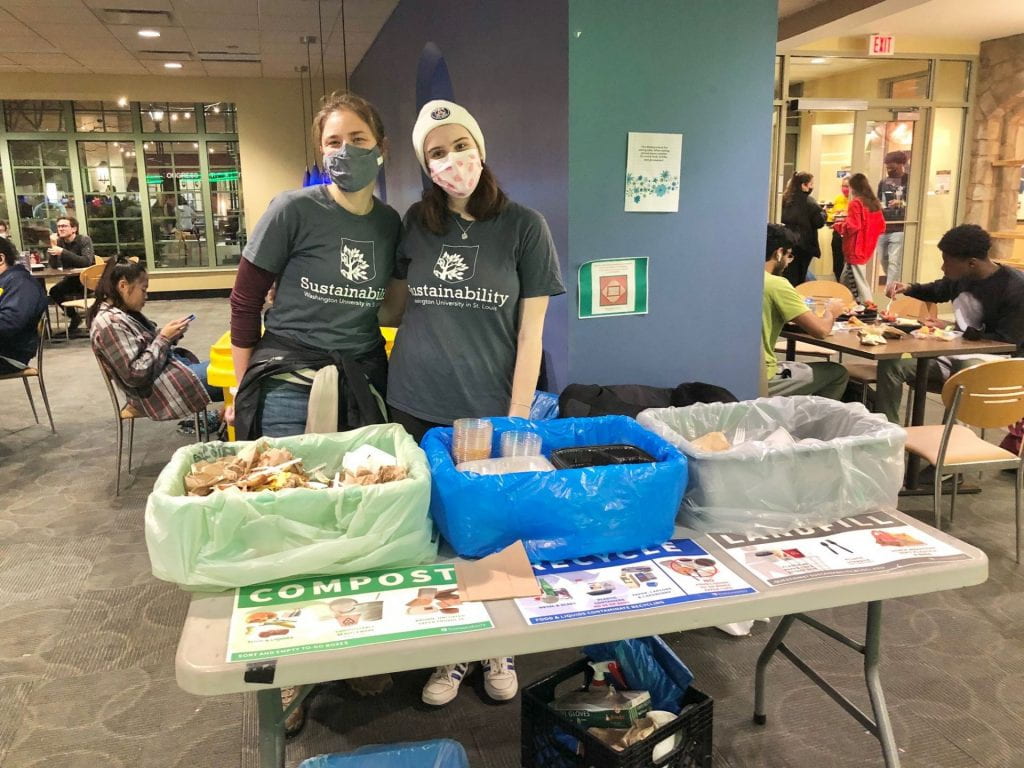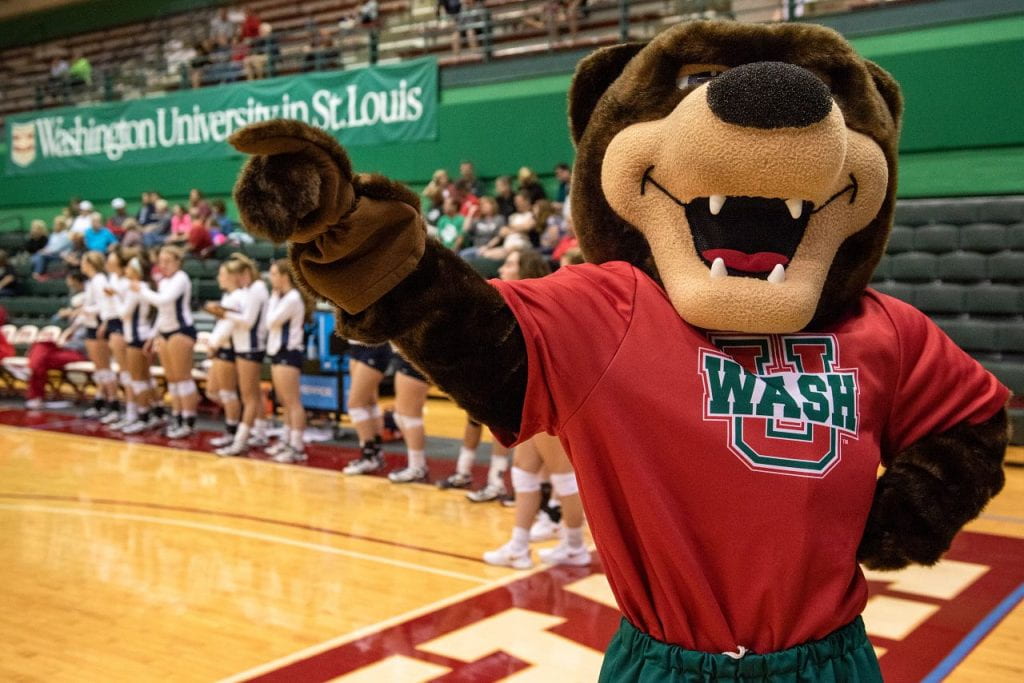Written by Office of Sustainability Student Associate, Jarea Fang, Class of 2022
Anyone who spends enough time at WashU knows about the importance of free merchandise. Convocation, Residential College Olympics, and college visits are only some of the instances in which free WashU “merch” is gifted to students and staff. Affectionately known as “swag,” these items range from drawstring backpacks, carabiners, and water bottles to bandanas and beanies. Securing quality WashU swag has never been easier, thanks to the University Marketing and Communications Office which vets promotional product vendors through the trademark licensing process.
The most popular of swag takes the form of t-shirts. Matching t-shirts for your event or department is a tried-and-true way to foster team spirit, and you can find evidence of this practice on every WashU webpage. Take our own, for example. On the Energy, Sustainability and Climate Change Internships (ESCC) page, you can see an image of ESCC interns sitting together in front of Schnuck Pavilion. Do you spot the matching blue shirts?
Every person working in and with the WashU Office of Sustainability owns one of these shirts. That includes Michelle Patterson, the Sustainability Business Manager and Internship Coordinator, who is also in charge of ordering more of these t-shirts when we run out. This is how she found herself huddled at her desk a few weeks ago, browsing through the University Marketing and Communications webpage looking for swag…
Swag of the more sustainable variety, of course.
Purchasing Sustainable Swag
While it was a brilliant idea to purchase sustainable merchandise that reflected the Office of Sustainability’s ideals, it made Michelle’s work a little harder than usual.
“We were looking for vendors that offered sustainable shirt options such as organic cotton, fair trade, plastic-free, and more. We also didn’t want to look outside of WashU’s list of licensed suppliers.” As it turns out, Michelle had to make a few calls in order to find what she was looking for. “The process was a bit long.”

WashU’s list of licensed suppliers is compiled by MarComm’s Trademark Licensing Program. This program’s mission is to promote quality and consistency across the university’s various branded products, while simultaneously supporting fair treatment of workers across the globe.
“We are affiliated with two organizations, the Fair Labor Association and the Worker Rights Consortium,” says Janelle Hizer, who manages the Trademark Licensing Program. “When you support the university’s licensed suppliers, you simultaneously support just and humane working conditions around the world.”
Every licensee on the list is screened annually. The annual survey includes questions about their code of conduct, supply chain, and environmental sustainability efforts. Janelle’s team reviews and evaluates their responses before renewing their licenses for another year.
Aside from that, all WashU licensees must also meet high standards of basic ethical behavior and good business practices. They must follow all proper workflow and reporting requirements, including submitting all graphic designs for approval before production of branded merchandise. This strict criteria and purposeful licensing process ensures that our university commits only to the suppliers and partners that show a high level of accountability and transparency.
In addition to meeting all the criteria above, four of the vendors from the Trademark Licensing list of approved vendors go above and beyond, offering expertise specifically around sustainable purchasing: Eco Promotional Products, Fairware, Kotis Designs (founded by ’03 WashU Alumni), and I.D. ME.
Shifting Priorities
Pleasurable to work with, prioritizes its workers, full of integrity. These were the priorities of the Trademark Licensing Program until Janelle started noticing a change in WashU’s culture. As members of the university have grown more aware of climate change and related issues in the past decade, many departments have been making calls like Michelle’s when they purchase swag. Soon enough, the Trademark Licensing Program started adjusting to fit the demand for eco-friendly vendors and licensees.
“When I first started in this position, the mentality was how much can we give away.” Janelle explains. “Now, when I am looped in on projects, I advocate for one quality item that will be kept and used, rather than multiple lower quality items that will end up in a landfill. I am also working with our internal licensees to always include an eco-friendly item in their suggestions to campus partners. People truly appreciate quality items that they are proud to use!”
Among her favorite changes implemented have been departments switching from cheap plastic water bottles to nicer quality water bottles from B Corp companies. She also loves seeing reusable utensils, straws, and bento boxes that are being ordered by university staff and students, many of which are sold or sometimes given away through the Office of Sustainability itself.
“We are proud to have the collaboration of the Office of Sustainability and other WashU units in raising awareness in the community,” says Karen Daubert, Assistant Vice Chancellor for Administration & Strategic Partnerships. “Due to our work together, more and more people make informed choices that support social and environmental sustainability.”
Reducing and Reusing
“Each year, more giveaways are ordered by the university than branded merchandise that is purchased from retail outlets,” says Karen. Which makes it even more important to employ sustainability practices when dealing with swag – because it is everywhere.
Of course, buying from eco-friendly vendors is not the only way to employ sustainable purchasing. Thinking ahead a little bit goes a long way, so if you’re buying merch soon, take a look at Karen and Janelle’s advice:
- Always prioritize eco-friendly or socially sustainable options.
- Getting an accurate count for merchandise means avoiding extras.
- If apparel is involved, always get sizes upfront.
- When appropriate, don’t date the item or put a specific event so that extras can be used in the future.
“Our licensees would be also delighted to share back stories about where, how, and by whom products are made, shipped, or packaged,” says Karen. So, to all WashU departments: Please take advantage of the resources given to you, and happy sustainable shopping!
